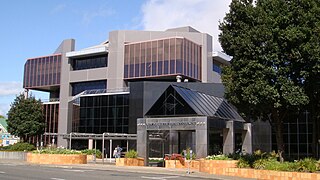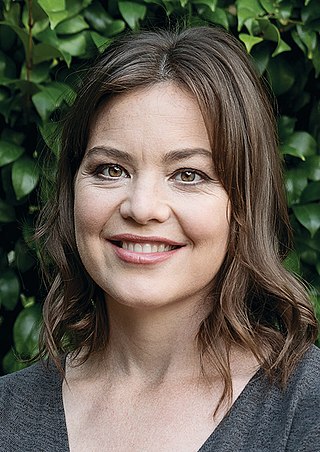Islamophobia is the irrational fear of, hostility towards, or hatred against the religion of Islam or Muslims in general. Islamophobia is primarily a form of religious or cultural bigotry; and people who harbour such sentiments often stereotype Muslims as a geopolitical threat or a source of terrorism. Muslims, with diverse ethnic and cultural backgrounds, are often inaccurately portrayed by Islamophobes as a single homogenous racial group.

Radio New Zealand, commonly known as RNZ or Radio NZ, is a New Zealand public-service radio broadcaster and Crown entity that was established under the Radio New Zealand Act 1995. It operates news and current-affairs network, RNZ National, and a classical-music and jazz network, RNZ Concert, with full government funding from NZ On Air. Since 2014, the organisation's focus has been to transform RNZ from a radio broadcaster to a multimedia outlet, increasing its production of digital content in audio, video, and written forms.

Jonathan Charles Toogood is a New Zealand musician who is the frontman of the rock band Shihad. He started playing guitar when he was "8 or 9" and became friends with Tom Larkin while at Wellington High School. Toogood and Larkin were fans of AC/DC and Metallica and started Shihad in 1988.

Islam is the third-largest religion in New Zealand (1.5%) after Christianity (32.3%) and Hinduism (2.9%). Small numbers of Muslim immigrants from South Asia and eastern Europe settled in New Zealand from the early 1900s until the 1960s. Large-scale Muslim immigration began in the 1970s with the arrival of Indian Fijians, followed in the 1990s by refugees from various war-torn countries.
The Federation of Islamic Associations of New Zealand (FIANZ) was set up in April 1979 by Mazhar Krasniqi and other Muslim community leaders to draw together the regional Islam organisations of Auckland, Wellington and Canterbury into one centralised New Zealand-wide body.

Hinduism is the second largest religion in New Zealand. It is also one of the fastest-growing religions in New Zealand. According to the 2023 census, Hindus form 2.9% of the population of New Zealand. There are about 153,534 Hindus in New Zealand.

Eugenie Meryl Sage is a New Zealand environmentalist and former politician. She was a Green Party Member of Parliament in the New Zealand House of Representatives from 2011 to 2023.

The New Plymouth District is one of the districts of New Zealand within Taranaki. It includes the city of New Plymouth and smaller towns such as Inglewood, Ōakura and Waitara.

Julie Anne Genter is an American-born New Zealand politician who is a member of the House of Representatives representing the Green Party of Aotearoa New Zealand. Genter was elected to each Parliament from 2011 to 2023 on the party lists, before being elected as the Member of Parliament for the Rongotai electorate in the 2023 election. She served as the Minister for Women, Associate Minister for Health and Associate Minister for Transport during the first term of the Sixth Labour Government. She holds dual citizenship of New Zealand and the United States.

Janet Holmes is a New Zealand sociolinguist. Her research interests include language and gender, language in the workplace, and New Zealand English.
Islamophobia in Australia is distrust and hostility towards Muslims, Islam, and those perceived as following the religion. This social aversion and bias is often facilitated and perpetuated in the media through the stereotyping of Muslims as violent and uncivilised. Various Australian politicians and political commentators have capitalised on these negative stereotypes and this has contributed to the marginalisation, discrimination and exclusion of the Muslim community.

Edwina Pio is a New Zealand academic. Pio is currently a full professor of Diversity at the Auckland University of Technology.
Vasanti Unka is a New Zealand writer, illustrator and graphic designer who has been involved in the book and magazine industry for many years. A number of her books have been shortlisted for awards and she won Best Picture Book and Margaret Mahy Book of the Year Award at the 2014 New Zealand Post Book Awards with The Boring Book. She lives in Auckland, New Zealand.
Islamophobia in France holds a particularly political significance since France has the largest proportion of Muslims in the Western world, primarily due to the migration from Maghrebi, West African, and Middle Eastern countries. The existence of discrimination against Muslims is reported by the media in the Muslim world and by the perceived segregation and alienation of Muslims within the French community. The belief that there is an anti-Muslim climate in France is heavily criticised by some members of the French Muslim community who terms it an 'exaggeration'.

Vanushi Sitanjali Walters is a New Zealand lawyer and politician who served as Member of Parliament in the House of Representatives for the Labour Party representing the Upper Harbour electorate from 2020 to 2023.
Donna Marie Pokere-Phillips is a New Zealand politician known for her conspiracy-driven views. She is the co-leader of the NZ Outdoors & Freedom Party.

Dome Valley is a rural area in the northern Auckland Region of New Zealand. It is situated between the towns of Warkworth and Wellsford. State Highway 1 and the Left Branch of the Mahurangi River run through the valley.

The Disinformation Project was a research group studying the effects of disinformation in the context of the COVID-19 pandemic in New Zealand. The research group was established in 2020 to combat disinformation during the COVID-19 pandemic but subsequently expanded its scope to cover other "conspiracy theory beliefs" including anti-vaccine, climate change denial, anti-immigration, the anti-gender movement, anti-Māori racism and hatred towards the LGBTQ+ community. The Disinformation Project also took an interest in monitoring neo-Nazism, far right activism, antisemitism and Islamophobia.

Allyn Sue Danzeisen, known as Aliya Danzeisen, is an American–New Zealand lawyer, teacher and the national coordinator of the Islamic Women's Council of New Zealand (IWCNZ). Danzeisen was appointed an Honorary Member of the New Zealand Order of Merit in 2024 for services to the Muslim community and women.













